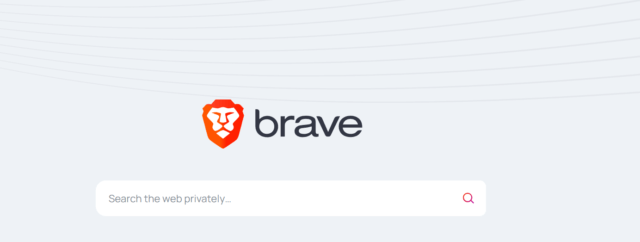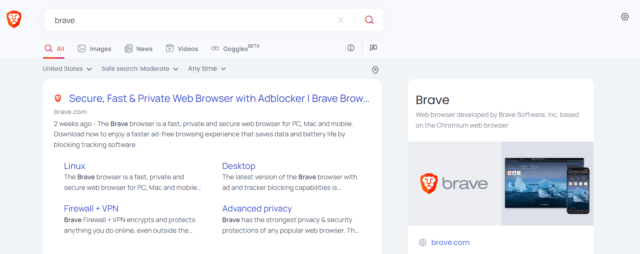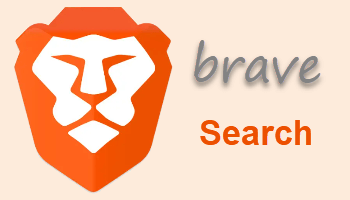Recently, Brave Search announced that it has removed the last remnant of Bing from its search engine, achieving 100% independence. With 22 million daily queries, Brave Search is the fastest-growing search engine since Bing – which launched in 2009.
When it launched in June 2021, Brave Search served results using its own index but still relied on 13% of its queries from third parties. Total independence was Brave Search’s primary goal and in less than a year, Brave Search’s independence score increased from 87% to 93%. But, Bing still represented 7% of Brave Search query results. Now, every Web search result in Brave Search is served by Brave’s index. They removed all search API calls to Bing.
Although Web searches are 100% independent, video and images still rely on a third party. Rather than calling an external service, Brave Search has opted for a simple redirect to either Google or Bing. But the Brave Search team has stated they are working on improving videos and image search capabilities.

Alternative Search Sites Dependence On Technology And Business Model
DuckDuckGo, Startpage, and others are often mentioned as “alternative search engines”. But the diversity of alternative search engines turns out to be an illusion. Most “alternatives” don’t have their own search index. Instead, they use Google’s or Microsoft Bing’s index and simply add their own user interface. The same is often true of the business model – most search engines not only adopt the results of Google or Bing but also the ads from their advertising networks.
Google’s search engine controls over 93 percent of the global search market. The next largest search engine is Microsoft’s Bing with a global share of about 3% (according to Statcounter as of March 2023).
Ecosia, Qwant, and Yahoo, for example, all rely on Bing. DuckDuckGo shows a mix from different sources but relies mainly on Bing. Others, like Startpage, get their results and ads directly from Google.
Why Independence Now
Brave stated that they accelerated their goal of 100% independence due to concerns about the future of the Bing API. As a result of Microsoft’s partnership with OpenAI, the price of the Bing API has increased significantly, ranging from 257% to 900%. “This creates undue pressure for search engines that rely partly or fully on the Bing Search API,” Brave stated. “The consequences of their reliance on Bing will play out in the following months when their long-term contracts expire.”
Brave Search API
Brave also announced plans to release its own Brave Search API. This will give developers and companies the ability to build custom search experiences that can compete with the quality provided by “Big Tech“. Due to Bing’s drastic price increase, other alternative search engines may switch to Brave Search’s API in the future.
Using Brave Search
Brave Search is an independent, privacy-focused search engine. Brave Search neither tracks you, your queries, your searches, nor your clicks. Nor does it use secret methods or algorithms to bias or censor results based on current events, political, religious, ethical, or other beliefs. Brave Search relies on anonymous community input to refine results, and community-created alternative ranking models to ensure diversity.

Brave Search supports nearly 50 bangs – shortcuts that quickly take you to search results on other sites. When you use Brave Search bangs within the Brave Browser, you can get search results from other search sites while still being protected from third-party ads and trackers from those sites.
Brave Search offers Google Fallback Mixing as an option for any query that does not return enough results allowing the browser to anonymously check Google for the same query. And users can use Goggles, a beta feature of Brave Search, to re-rank and filter results from the Brave Search index.
Bottom Line
Is Brave Search any good? I have been using Brave Search on and off for a while. When it first came out, I did not find the searches that good, but they have improved significantly. I use the Brave Browser (see Jim Hillier’s review of the Brave Browser) as my default browser and, a while back, I set Brave Search as the default search engine in my browser (see Jim Hillier’s article on how to set and manage search engines in Brave). You can also use Brave Search by visiting search.brave.com from any browser. Having an alternative search engine to Google or Bing is a good thing and Brave Search gives users that option.
If you give Brave Search a try, let us know in the comments whether or not you like it.
—
